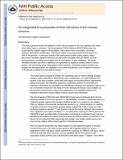An integrated encyclopedia of DNA elements in the human genome
Author(s)
Altshuler, Robert Charles; Ernst, Jason; Kellis, Manolis; Kheradpour, Pouya; Ward, Lucas D.; Eaton, Matthew Lucas; Hendrix, David A.; Jungreis, Irwin; Lin, Michael F.; Washietl, Stefan; ... Show more Show less
DownloadKellis_An integrated.pdf (4.826Mb)
OPEN_ACCESS_POLICY
Open Access Policy
Creative Commons Attribution-Noncommercial-Share Alike
Terms of use
Metadata
Show full item recordAbstract
The human genome encodes the blueprint of life, but the function of the vast majority of its nearly three billion bases is unknown. The Encyclopedia of DNA Elements (ENCODE) project has systematically mapped regions of transcription, transcription factor association, chromatin structure and histone modification. These data enabled us to assign biochemical functions for 80% of the genome, in particular outside of the well-studied protein-coding regions. Many discovered candidate regulatory elements are physically associated with one another and with expressed genes, providing new insights into the mechanisms of gene regulation. The newly identified elements also show a statistical correspondence to sequence variants linked to human disease, and can thereby guide interpretation of this variation. Overall, the project provides new insights into the organization and regulation of our genes and genome, and is an expansive resource of functional annotations for biomedical research.
Date issued
2012-09Department
Massachusetts Institute of Technology. Computer Science and Artificial Intelligence Laboratory; Massachusetts Institute of Technology. Department of Electrical Engineering and Computer ScienceJournal
Nature
Publisher
Nature Publishing Group
Citation
Dunham, Ian, Anshul Kundaje, Shelley F. Aldred, Patrick J. Collins, Carrie A. Davis, Francis Doyle, Charles B. Epstein, et al. “An Integrated Encyclopedia of DNA Elements in the Human Genome.” Nature 489, no. 7414 (September 5, 2012): 57–74.
Version: Author's final manuscript
ISSN
0028-0836
1476-4687